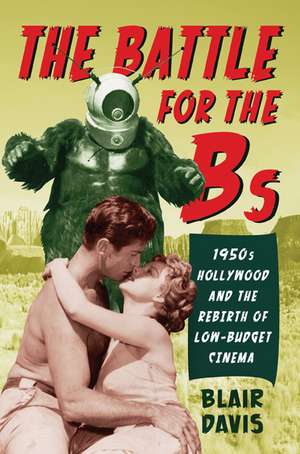The Battle for the Bs: 1950s Hollywood and the Rebirth of Low-Budget Cinema
Autor Blair Davisen Limba Engleză Paperback – 5 apr 2012 – vârsta ani
The emergence of the double-bill in the 1930s created a divide between A-pictures and B-pictures as theaters typically screened packages featuring one of each. With the former considered more prestigious because of their larger budgets and more popular actors, the lower-budgeted Bs served largely as a support mechanism to A-films of the major studios—most of which also owned the theater chains in which movies were shown. When a 1948 U.S. Supreme Court antitrust ruling severed ownership of theaters from the studios, the B-movie soon became a different entity in the wake of profound changes to the corporate organization and production methods of the major Hollywood studios.
In The Battle for the Bs, Blair Davis analyzes how B-films were produced, distributed, and exhibited in the 1950s and demonstrates the possibilities that existed for low-budget filmmaking at a time when many in Hollywood had abandoned the Bs. Made by newly formed independent companies, 1950s B-movies took advantage of changing demographic patterns to fashion innovative marketing approaches. They established such genre cycles as science fiction and teen-oriented films (think Destination Moon and I Was a Teenage Werewolf) well before the major studios and also contributed to the emergence of the movement now known as underground cinema. Although frequently proving to be multimillion-dollar box-office draws by the end of the decade, the Bs existed in opposition to the cinematic mainstream in the 1950s and created a legacy that was passed on to independent filmmakers in the decades to come.
In The Battle for the Bs, Blair Davis analyzes how B-films were produced, distributed, and exhibited in the 1950s and demonstrates the possibilities that existed for low-budget filmmaking at a time when many in Hollywood had abandoned the Bs. Made by newly formed independent companies, 1950s B-movies took advantage of changing demographic patterns to fashion innovative marketing approaches. They established such genre cycles as science fiction and teen-oriented films (think Destination Moon and I Was a Teenage Werewolf) well before the major studios and also contributed to the emergence of the movement now known as underground cinema. Although frequently proving to be multimillion-dollar box-office draws by the end of the decade, the Bs existed in opposition to the cinematic mainstream in the 1950s and created a legacy that was passed on to independent filmmakers in the decades to come.
Preț: 192.15 lei
Preț vechi: 268.04 lei
-28% Nou
Puncte Express: 288
Preț estimativ în valută:
36.77€ • 38.49$ • 30.60£
36.77€ • 38.49$ • 30.60£
Carte indisponibilă temporar
Doresc să fiu notificat când acest titlu va fi disponibil:
Se trimite...
Preluare comenzi: 021 569.72.76
Specificații
ISBN-13: 9780813552538
ISBN-10: 0813552532
Pagini: 260
Ilustrații: 15 photographs
Dimensiuni: 152 x 229 x 18 mm
Greutate: 0.37 kg
Ediția:None
Editura: Rutgers University Press
Colecția Rutgers University Press
ISBN-10: 0813552532
Pagini: 260
Ilustrații: 15 photographs
Dimensiuni: 152 x 229 x 18 mm
Greutate: 0.37 kg
Ediția:None
Editura: Rutgers University Press
Colecția Rutgers University Press
Notă biografică
BLAIR DAVIS is an assistant professor in the College of Communication at DePaul University. His essays appear in the Historical Journal of Film, Radio, and Television and the Canadian Journal of Film Studies, and in such anthologies as American Horror Film, Caligari’s Heirs, and Horror Film: Creating and Marketing Fear.
Cuprins
Acknowledgments
The Bs Take Flight: An Introduction
1. Hollywood in Transition: The Business of 1950s Filmmaking
2. The Battle Begins: Hollywood Reacts, Poverty Row Collapses
3. The Rebirth of the B-Movie in the 1950s
4. Attack of the Independent: American International Pictures and the B-Movie
5. Small Screen, Smaller Pictures: New Perspectives on 1950s Television and B-Movies
6. Big B, Little b: A Case Study of Three Films
7. Notes from the Underground: The Legacy of the 1950s B-Movie
Notes
Index
The Bs Take Flight: An Introduction
1. Hollywood in Transition: The Business of 1950s Filmmaking
2. The Battle Begins: Hollywood Reacts, Poverty Row Collapses
3. The Rebirth of the B-Movie in the 1950s
4. Attack of the Independent: American International Pictures and the B-Movie
5. Small Screen, Smaller Pictures: New Perspectives on 1950s Television and B-Movies
6. Big B, Little b: A Case Study of Three Films
7. Notes from the Underground: The Legacy of the 1950s B-Movie
Notes
Index
Recenzii
"The Battle for the Bs is a highly-readable book that shies away from the jargon that often accompanies film theory, which will make it valuable to students studying film history as well as students who want to learn more about mid-twentieth century cultural history."
"Trenchantly, Blair Davis upends commonplaces about B-movies as marginal, demonstrating instead their centrality to American cinema and, indeed, to mid-century popular culture overall. A rich, rigorous contribution to film history."
"Blair Davis has rescued low-budget cinema from scholarly neglect with this excellent and persuasive account, a fine example of superior scholarship."
"A fascinating study of post-World War II cinema."
Descriere
In The Battle for the B’s, Blair Davis analyzes how B-films were produced, distributed, and exhibited in the 1950s and demonstrates the new possibilities that existed for low-budget filmmaking at a time when many in Hollywood abandoned the B’s. B-movies innovated such industrial components as demographic patterns and marketing approaches, created such genres as science fiction and the teen-oriented films of the early and mid fifties, and led to the emergence of “New Poverty Row,” a movement now known as underground cinema.
